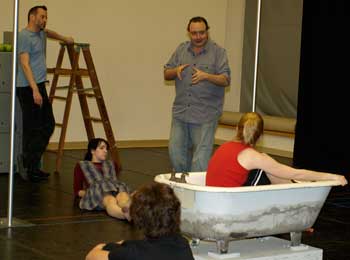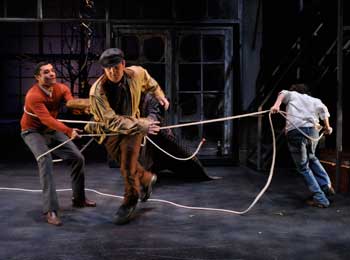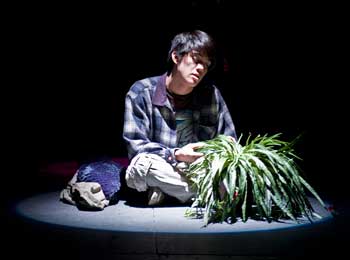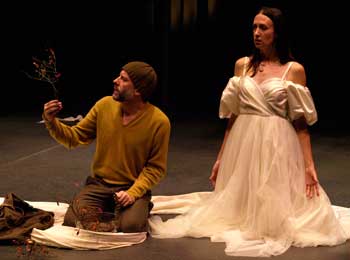Translating Russia
for America
By John Freedman
I once met a man who could not understand why anyone would need more than one translation of War and Peace. “It’s just words transposed into English,” he said incredulously. “Once it’s done it’s done.”
It is probable that everyone reading these notes – written, after all, for a university-based project in a prestigious theater program – recognizes that as a radically uninformed statement. What not everyone may realize, however, is the profound degree to which fuzzy thinking penetrates general opinions about translation. Respected producers and directors have told me, “Oh, we’ll clean that clumsy translation up before we go into rehearsals.”
I have also heard tell of ancient mariners saying, “We’ll just plug that little hole,” before heading out to stormy seas.
Translation is an art. In fact, a translator is a director, a playwright, an actor and an audience member all rolled into one. He or she constantly must hear the questions of the actor – “Can I say this?” – even as the spectator in the mind’s eye is wondering, “What does this mean?” while the segment of the brain thinking about how to direct this slowly emerging text is pondering what gestures and intonations the chosen words will call into being. All of this while the original author’s voice – with its unique rhythms, diction and melodies – must be singing in perfect pitch in the translator’s head.
No one in the theater is more sensitive than actors and spectators. It is one of the reasons why we love them so. Metaphorically, each must be invited to embark on a journey lacking hazardous obstacles and treacherous turns not planted there by the author. If an actor speaks a word that sticks in his or her craw, it must be because the author willed it, not because the translator was lazy. Every time an audience member is distracted by questions or doubts not envisioned by the author, communication has broken down. And the translator is to blame.
A play making the transition from Russian into English is threatened by a myriad of potentially catastrophic misunderstandings. As languages, Russian and English are structured differently, and so provide vastly different cadences, stores of information and electric impulses. That is nothing, however, compared to the pitfalls involved in translating cultural phenomena. Did you know, for example, that the contemporary Russian word for “red” is the same one the language still employs for “beautiful” in fairy tales? “Red Square,” in other words, has nothing to do with the place where the Red Army used to march. That gives the notion of “seeing red” a whole new sensation, doesn’t it?
In other words, much in a translation must be interpreted as well. But it must be done inconspicuously and in a way that is organic to the original text. So, yes, you may add scholarship to the jobs a translator is called upon to do well.
English is another problem. The British have been good at sniffing out new plays in Russia, translating, publishing and staging them. But as George Bernard Shaw said so famously: “England and America are two countries divided by a common language.” Indeed, many British translations done in the last decade look and sound as foreign to us as any Russian, German or French play might.
The New Russian Drama: Voices in a Shifting Age project was established to bring the riches of contemporary Russian drama to America in the American idiom. We believe this is the only way that such major contemporary writers as Olga Mukhina, Maksym Kurochkin, Yury Klavdiev, Vyacheslav Durnenkov, Yaroslava Pulinovich and the Presnyakov brothers can fully be appreciated in the United States.
We also believe there is no one way to create a translation that will allow a play to speak clearly and breathe fully in a new language. As such, we experimented with various methods.
We engaged playwright Kate Moira Ryan to create a new American adaptation of Mukhina’s “Tanya-Tanya.” Playwrights Juanita Rockwell and David M. White worked closely with Russian director Yury Urnov to fashion American variants of the Presnyakovs’ “Playing Dead” and Klavdiev’s “Martial Arts,” respectively. John Hanlon, with Kurochkin’s “Vodka, F***ing, and Television,” and I, with Durnenkov’s “Frozen in Time,” Kurochkin’s “The Schooling of Bento Bonchev,” Pulinovich’s “Natasha’s Dream” and “I Won,” and Klavdiev’s “The Polar Truth,” took the traditional route of a lone translator rendering an author’s text.
All of us, working with the writers and production teams, endeavored to help five unique Russian voices “speak American” without losing their native flavor, points of view or insights. Each production in this season-long project is confirmation of our belief that American theater will be richer when it embraces what a new generation of Russian playwrights is writing.

Fulbright Scholar-in-Residence Yury Urnov directs Towson University students in rehearsal for Tanya Tanya by Olga Mukhina.
November 2009.
Photo: Robyn Quick.

David Gregory, Matt Shea and Rich Buchanan in Towson University’s production of Tanya Tanya by Olga Mukhina.
December 2009.
Photo: Jay Herzog.

Francis Cabatac in The Polar Truth by Yury Klavdiev. Towson University.
November 2009.
Photo: Tina Staffieri.

Joseph Ritsch and Caroline Reck in Towson University’s production of Tanya Tanya by Olga Mukhina.
December 2009.
Photo: Robyn Quick.



